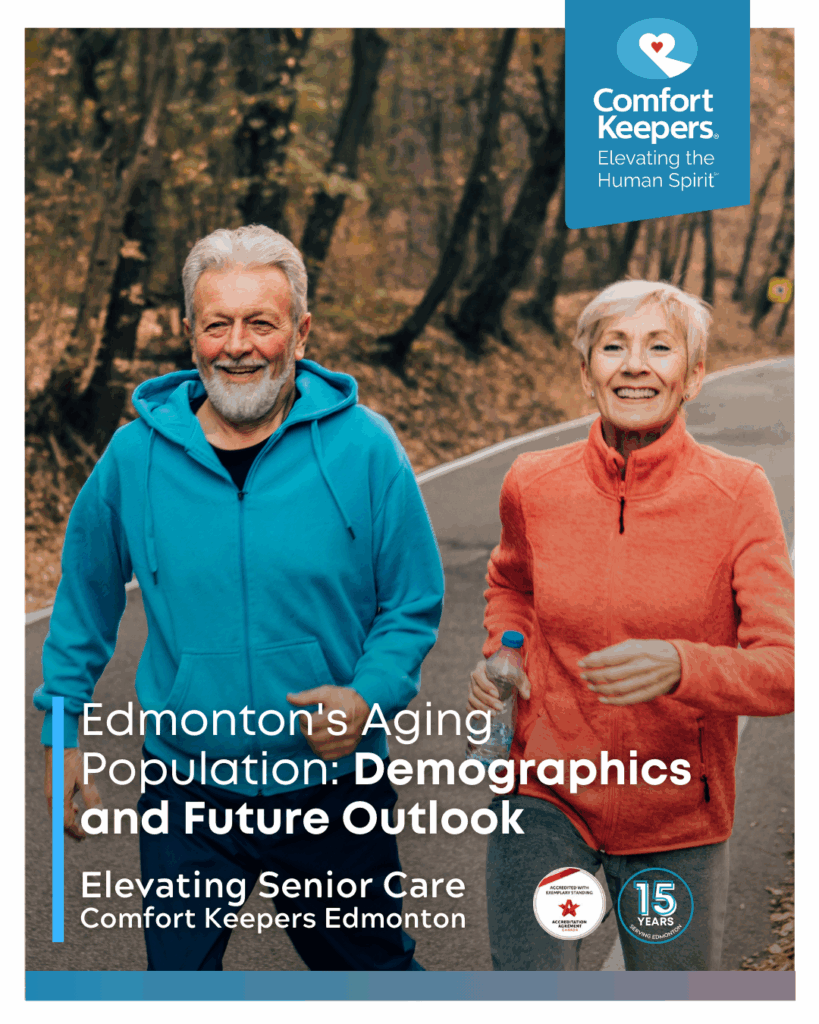Edmonton’s Aging Population: Demographics and Future Outlook
Edmonton Senior Home Care | August 28, 2025
Edmonton remains one of Canada’s youngest major metropolitan areas, but significant demographic transformation lies ahead. With 14% of its population currently over 65 and a median age of 37.6 years, Wikipedia Edmonton’s senior population is projected to increase by 121% by 2030, Alberta Health Services creating both challenges and opportunities for healthcare, housing, and economic planning.

Current demographic landscape shows Edmonton’s youthful advantage
Edmonton’s 1.49 million residents maintain a distinctively young age profile compared to other major Canadian cities. The Census Metropolitan Area (CMA) reports 14.7% of residents are 65 or older, well below the national average of 19%. According to the data insider, this demographic advantage stems from robust interprovincial migration, with Edmonton gaining 13,893 net migrants in 2023-24—the highest level in over 20 years. Statistics Canada
The city’s age structure breaks down as 19% children (0-14), 67% working-age adults (15-64), and 14% seniors (65+). The data insider Edmonton’s median age of 37.6 years ranks among the three youngest major metropolitan areas in Canada, younger than Calgary (38.0 years), Toronto (39.2 years), Vancouver (39.7 years), and Ottawa (39.2 years). Calgary.ca
Within Edmonton’s senior population, the largest group is ages 65-69 (38% of seniors), followed by 70-74 (26%), and 75-79 (17%). The 85+ population represents 1.7% of total residents, below the national urban average of 2.3%. Statistics Canada This age distribution reflects Edmonton’s position in the early stages of population aging compared to eastern Canadian cities.
Historical trends reveal accelerating demographic shift
Edmonton experienced dramatic demographic changes between 2011-2021, with total population growth of 22% and senior population growth of 81%. The proportion of residents over 65 increased from 11.4% in 2011 to 14.7% by 2024, while the median age rose from 36.5 to 37.6 years. Wikipedia
This transformation reflects natural aging of baby boomers combined with continued attraction of younger workers to Alberta’s resource-based economy. The working-age population maintained stability at 67-71%, supporting economic growth while the dependency ratio gradually shifts. The consistent influx of interprovincial migrants and international immigrants has helped Edmonton maintain its youthful profile longer than many Canadian cities.
Regional comparisons highlight Edmonton’s competitive position
Among major Canadian metropolitan areas, Edmonton consistently ranks in the top three for youngest demographics. Calgary maintains a similar profile with 14% seniors and a 38.0-year median age, Canada Crime Index making the Alberta urban corridor distinctively young compared to eastern Canada.
Vancouver leads aging trends with a 39.7-year median age, while Toronto and Ottawa both report 39.2 years. Eastern cities like Halifax, Montreal, and Maritime urban centers show even higher aging levels. Only Regina (37.1 years) and Saskatoon (35.6 years) report younger median ages than Edmonton among major centers. Calgary.ca
The 85+ population comparison reveals Edmonton’s early aging stage. With 1.7% of residents over 85, Edmonton significantly trails mature markets like Peterborough (3.4%), Trois-Rivières (3.4%), and Victoria (3.1%). statcan This suggests Edmonton has 10-15 years before experiencing the intensive aging pressures facing eastern Canadian cities.
Future projections signal dramatic demographic transformation
Statistics Canada projects Alberta’s senior population will reach 20% by 2051, alberta.ca with the most rapid aging occurring 2024-2030 as baby boomers transition to 65+. statcan For Edmonton specifically, the 121% increase in seniors by 2030 represents unprecedented demographic change, Alberta Health Services, with the 85+ population expected to surge starting in 2031. CBC News.
Provincial projections show Alberta’s working-age population declining from 67.6% (2020) to 64.8% (2040), while the dependency ratio shifts from 5 working-age adults per senior to 3 by mid-2040s. statcan Edmonton CMA could reach 2 million residents by 2040, Canadapopulation with seniors comprising potentially 18-20% of the population.
The geographic concentration of growth matters significantly. The Edmonton-Calgary corridor is projected to capture 87% of immigrants and 86% of interprovincial migrants, CBC News meaning demographic pressures will intensify in Alberta’s two major urban regions while rural areas experience different aging patterns.
Economic implications require strategic planning
The demographic shift carries substantial economic consequences. Healthcare costs alone are projected to increase 30% from aging demographics, equivalent to requiring a 50% income tax increase to fund current service models. Alberta seniors currently represent 12.8% of the population but account for 36.9% of provincial healthcare spending. Fraser Institute
Labour force participation will decline as the proportion of residents over 55 increases from 36% (2016) to 40% (2026). Statistics Canada This transition historically reduces per-capita income growth from 1.3% to 0.9% annually. Fraser Institute For Edmonton’s resource-dependent economy, this could mean significant workforce shortages during economic expansion periods.
Housing demand projections show 59% growth in demand versus 49% population growth by 2041, driven by aging household patterns. Ground-oriented housing demand will grow 77% (278,877 units) while rental demand increases 15%. Urban Futures The preference of aging residents for aging-in-place will reshape housing markets and urban planning priorities.
Healthcare system preparation accelerates
Alberta Health Services has identified infrastructure deficiencies at 18 facilities in the Edmonton Zone, leading to $260 million in recent investments. Alberta Health Services The Edmonton 2030 healthcare planning process represents the first comprehensive long-term planning since AHS zone creation, Alberta Health Services focusing on matching programs and services to demographic projections.
Long-term care capacity requires expansion as 92% of Albertans prefer to age at home but complex care needs increase with age. Elections Canada Current continuing care includes Home & Community Care, Supportive Living, and 24-hour nursing facilities. Alberta Health Services Wait lists exist for placements, though specific Edmonton metrics remain limited in public reporting.
Healthcare workforce development has become critical, with strategy focusing on team-based care, full scope of practice utilization, and workforce retention. Government of Alberta The aging population creates both increased demand for services and potential workforce shortages as healthcare workers themselves age.
Social services adapt to demographic reality
The City of Edmonton joined the WHO Global Network of Age-Friendly Cities in 2010, City of Edmonton developing comprehensive programming through the Age Friendly Edmonton initiative. edmonton Services include recreation programs, housing support, property tax deferral, transportation assistance, and home support coordination through six district hubs. City of Edmonton
Social isolation emerged as a key concern, addressed through the 211 Seniors Information Line, WHO community engagement programs, and social prescribing initiatives at 10 Alberta locations including Edmonton. Calgaryunitedway The Seniors Coordinated Outreach program provides integrated access to multiple support services. City of Edmonton
Alberta’s provincial approach includes Healthy Aging Alberta coordination, Community and Home Supports funding, and assisted transportation projects. Calgaryunitedway The integration of health and social services, such as Comfort Keepers Edmonton, becomes crucial as the senior population grows and diversifies in needs and backgrounds.
Social services for seniors in Edmonton, Alberta
- Client Directed Home Care
Alberta Health Services (AHS) Home and Community Care clients can take control of their home care through the Client Directed Home Care Invoicing (CDHCI) program. Under CDHCI, clients after approval based on an assessment by a AHS Case Manager select an Alberta Blue Cross-registered home care agency. This agency then provides services for the pre-approved monthly hours and directly bills Alberta Blue Cross for reimbursement.
Praise for Comfort Keepers Edmonton, an approved Service Provider for the Client Directed Homecare Invoicing (CDHCI) Program Offered by Alberta Health Services.
“We have been clients of this franchise since it started and have never thought of leaving. The caregivers they provide are very caring and supportive! The office staff are exceptional to work with! Give them a try and you won’t regret it.”
- Special Needs Assistance for Seniors Program
Low-income seniors in Alberta are eligible for significant financial assistance designed to improve their quality of life and ensure their well-being.
The Special Needs Assistance for Seniors program can encompass a range of services, from light housekeeping assistance to some appliances and medical equipment, enabling seniors to live independently in their own homes.
- Assisted Living Alberta (ALA)
Helping Albertans live and age well in their homes, communities, or other settings that suit their needs the Alberta Government has created a new dedicated agency Assisted Living Alberta (ALA). ALA is committed to providing consistent, effective care throughout Alberta. This is achieved by enhancing homecare and community services, accelerating access to supportive living and continuing care facilities, and ensuring Albertans and their caregivers are well-informed.
Income and housing patterns reveal vulnerability
Edmonton senior income levels show significant variation by age and gender. Median annual income declines from $40,066 (ages 65-69) to $25,503 (85+), with women consistently earning less across all age groups. This pattern creates affordability pressures as housing costs consume increasing portions of income with age.
Housing costs represent 14.9% of income for seniors aged 65-69, rising to 25.7% for those 85+. Despite high homeownership rates (79.7%-86.3% across age groups), 18% of seniors experience core housing needs, spending more than 30% of household income on shelter.
The income sources reveal dependence on government programming: 93% receive Old Age Security and Canada Pension Plan benefits, while only 29% have employment income and 61% receive private pensions. Elections Canada This structure makes seniors particularly vulnerable to inflation and policy changes affecting government benefits.
Strategic recommendations emerge from research
Edmonton’s demographic transition requires proactive planning across multiple sectors. Healthcare infrastructure investment must accelerate beyond the current $260 million commitment, Alberta Health Services with particular focus on home and community care expansion to meet aging-in-place preferences.
Housing policy should emphasize age-friendly design standards, secondary suite development, and affordable seniors housing options. The projected 59% growth in housing demand necessitates coordinated regional planning between Edmonton and surrounding municipalities experiencing similar demographic pressures.
Economic development strategies should address workforce transitions, with emphasis on older worker retention, immigration attraction, and productivity enhancements to offset declining labor force participation. The resource sector advantage that attracts younger workers may not persist indefinitely, requiring economic diversification planning.
Conclusion: positioning for demographic transformation
Edmonton’s current position as one of Canada’s youngest major metropolitan areas provides valuable lead time for demographic transition planning. The 121% projected increase in seniors by 2030 represents both unprecedented challenge and opportunity Alberta Health Services for innovative age-friendly community development.
The convergence of rapid population growth (4.5% annually) with accelerating aging creates unique planning requirements. Statistics Canada Edmonton’s success in managing this transition will significantly influence quality of life for current and future residents while maintaining the city’s competitive economic position within Canada’s changing demographic landscape.
The comprehensive data reveals Edmonton stands at a critical inflection point, with policy decisions made in the next 3-5 years determining how successfully the city navigates its demographic future. Early action on healthcare infrastructure, age-friendly housing, and economic transition planning will position Edmonton as a model for aging-ready urban development in Canada.
Comfort Keepers® Edmonton is Proud to Offer a Wide Range of Home Senior Care Services
Our trained caregivers will ensure your loved one is comfortable, independent and safe in their home. On top of that, we will also aim to enhance their overall health, quality of life and general happiness.
Top-Notch Home Healthcare for Seniors in Edmonton, Alberta
Comfort Keepers of Edmonton offers a broader range of senior care services. We offer retirement care, respite care, senior care, companionship care, end-of-life care, post-surgery care, palliative care, personal care, and senior living transition services. If you are concerned about the health and well-being of your aging loved ones, we can provide 24-hour care and more!
Helping Seniors Age-in-Place with Companionship Care and Interactive Caregiving™
Empathetic care starts in the heart and allows us to meet our client’s needs. Our trained caregivers are selected with one specific quality in mind, empathy. We strive to stimulate our clients emotionally, mentally and socially, thus enhancing their overall quality of life.
Our Interactive Caregiving™ provides a system of care that addresses companionship, safety, nutrition, mind, body, and activities of daily living (ADLs). The system increases seniors’ sense of well-being, independence and companionship by focusing on Senior Mind, Senior Body, Senior Nutrition, and Senior Safety.
Affordable and Client-Directed Homecare is Available for Qualifying Albertans
Comfort Keepers® Edmonton is an Approved Service Provider for the Client Directed Homecare Invoicing (CDHCI) Program Offered by Alberta Health Services.
What is the Client Directed Home Care Invoicing Program (CDHCI)?
CDHCI is a great program provided by Alberta Health Services (AHS), allowing clients to choose an approved agency like Comfort Keepers Edmonton for Personal Care, Respite Care and Homemaking needs. The chosen agency can then bill AHS directly for services rendered for approved hours through Alberta Blue Cross. Read more about the program HERE.
Accredited Home Care Edmonton
Comfort Keepers® Edmonton was awarded the “Accredited with Exemplary Standing” seal by Accreditation Canada. This honour demonstrates Comfort Keepers’ commitment to offering safe, high-quality home care to its senior clients in Edmonton, AB.
To learn more about senior in-home care in Edmonton, contact the Comfort Keepers® office. Our service territory includes Edmonton, Devon, Sherwood Park, Stony Plain and surrounding areas, contact the Comfort Keepers Edmonton office at 780-465-4665.
Individualized Home Care Options
Long-Term Home Care, 24 Hour Home Care & Short Term Care Options Customized for You







